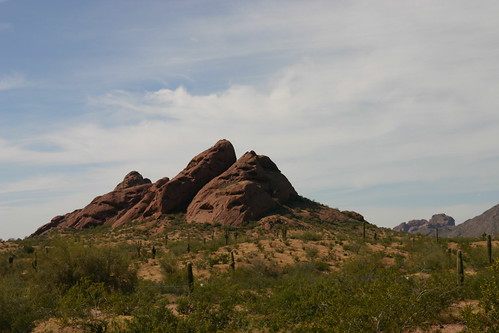A few weeks ago, I received the following email:
Hi Joe,
I moved from Scottsdale, Arizona, to California last summer, and brought an unfinished painting of Papago Buttes along with me. I looked around for a photograph to help me finish the painting, and I found one that seems to be attributed to you on Wikipedia. The shot helped me enormously, and I ended up finishing the painting and giving it to a friend.
The more I learn about artwork and photography, the more I realize that asking permission before using a photo, even when referring to it for painting, is the right thing to do. I just wanted to be in touch to apologize for failing to do this, and to offer to email you a photograph of my finished painting. I think you’re a good photographer and you helped me by sharing your image online.
Thanks,
The photo that Robert used as a guide for his painting was this one:

It’s a picture I took several years ago, during an April 2005 visit to Phoenix, where friends of mine lived for a while. I thought it was a really interesting geological structure, so different from the green and gentle landscapes of the East Coast (where I live). We had visited late in the day, when the light was particularly warm and nice.
And it was hot as hell. I remember that much.
This was one of the first pictures I posted to Flickr. I had purchased a DSLR, a Canon Digital Rebel, and was taking pictures of almost everything. Digital had brought out my inner photographer.
I added the title Papago Buttes more for my benefit than anyone else. I wanted to remember where these rocks were in case I went back.
At the time, I had chosen a Creative Commons Attribution license for all my photos, one that allowed anyone to use them long as I was credited.
The photo was reviewed on 10:45, 7 April 2007 (UTC) by the FlickreviewR robot and added to Wikipedia’s image library. The robot is a program that basically harvests images that are freely available in Flickr and confirms their availability and license.
This was all fine with me. That’s why I chose the Creative Commons Attribution license – I liked my photo and was happy that other people used it.
I didn’t know that this photo was in Wikipedia. I found out after my picture of another Arizona landscape, Hole in the Rock, had been selected by an editor for the Papago Buttes Wikipedia page. I looked around Wikipedia and found a couple of my photos in the online encyclopedia.
This is all geeky and interesting but it’s not exactly art. It’s fascinating look at some of the robotic and human processes that make the web possible. I could wax rhapsodically about the power of crowds, the value of free or the democratization of content creation. All worthy topics.
Yet, the part which really thrilled me was that my simple photo helped create a piece of analog art. Paint on a canvas created by a human. If you look at the photo and the artwork, there are some definite similarities:


The line between photo rights, remixing and creative use has become very blurry and controversial. For example, the AP is suing Shepard Fairey over his apparent use of one of their photos.
Robert referenced this issue in his email:
The more I learn about artwork and photography, the more I realize that asking permission before using a photo, even when referring to it for painting, is the right thing to do.
My perspective:
- I put the photo in the Creative Commons. I wanted it to be used.
- The painting is a brand-new creation, summoned from the ether by the artist, using his skills, experience and with my photo as one of many influences. He selected the brushes, paint, canvas and created the work.
- I’m thrilled. It probably helps that I like the painting a lot but I’m really honored that my photo helped create this work of art. Robert sent me a digital copy of the painting which I’m using as my desktop.
This event also underscores my belief that the Internet is a wonderful and unexploited opportunity for artists, photographers and writers. When I took that photo at Papago Buttes on one hot April day, I had no idea that it would end up in Wikipedia and inspire a painting. This photo doesn’t lie forgotten in a drawer. Thanks to the web, it’s gone on to a life of its own.
I’m glad this image sharing worked out this way. Papago Buttes is an amazing place and I was glad to get to know it a bit while living in Scottsdale. I love the way the internet can be used to connect people with very specific interests, and I’m glad to have shared a perspective on that one.
Your blog post had me hooked from the first sentence.
Thank you for the awesome content, it’s always appreciated
Your positivity and enthusiasm are infectious I can’t help but feel uplifted and motivated after reading your posts